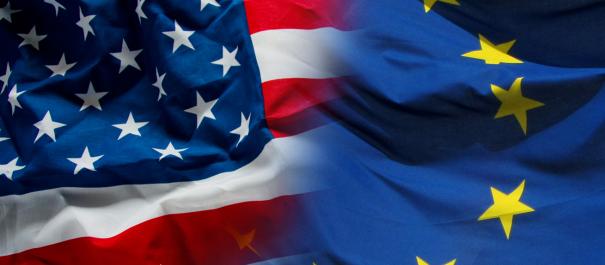
Thursday, November 3, 2016
TTIP: Economy should support life
Let me be clear, trade is an essential part of human civilization and a society cannot exist without it. This article therefore should not be considered as anti-TTIP but rather as pro-(human) life.
Economic growth at all cost
What are the risks of a treaty that focuses on growth above all else? Economic growth, whether induced by TTIP or otherwise, also bears negative consequences. Our unrestrained pursuit of economic growth means that resources and energy are required in larger quantities than ever before. As of yet, our economies and demand for energy are not sustainable. Rather than striving for additional growth, perhaps we should learn to limit ourselves. Considering the looming shortages of raw materials, climate change, terrorism, famine, and the refugee crisis, we should consider setting other priorities than economic growth alone. Under the current circumstances, the U.S. and EU should seek cooperation in a transition towards a sustainable economy. In this transition, they can take the lead and push for worldwide standards. Such an alternative to TTIP would suit an economy that promotes well-being and life, as included in the work programme of the European Christian Political Movement (ECPM):
“In essence, economy is about life. The purpose of all economic activity is to support life and advance the well-being of all. The economy is meant to provide sufficient means for all people in order that family life may be supported, to make people’s creative talents flourish, and to find solutions for the problems they face.”
As Christian politicians, we are often proponents of developmental work, deployment of armed forces for peacekeeping missions and fair trade. But do we really understand that everything we buy in our (Western) society, everything we consume and dispose of, affects the lives of people elsewhere? Most of the founding fathers of modern day Europe were devout Christians and these statesmen saw the chance to rebuild Europe as a “community of peoples deeply rooted in Christian values”. Values like subsidiarity, equality, freedom, solidarity and peace. The European Union and European countries in general have chosen a different path: the path of neoliberalism and “consumables”. The European and American legacies are double-sided: we left the world much good, but also caused a lot of damage and mischief.
Real problems and realistic solutions
If economic growth is the neo liberal ‘golden bullet’ solution, then what exactly is the problem? In general, the people of Europe and the United States are not living in poor conditions. The multinationals, their CEO’s and shareholders are generally not in trouble to pay or receive their dividend, salary or bonuses. That is why TTIP never lost the image of this ‘extraction-based economy of the rich’. Many economists now regard the divide between rich and poor as a serious economic problem.
The global poverty divide is becoming a serious problem for the EU as can be seen in the migration streams. While the free market has uplifted many, today’s neoliberal shape of the free markets does no longer deliver that same outcome. If this is the real challenge, should we not put our citizen’s wellbeing and the bridging of those fundamental gaps front and centre before assuming that economic growth as such will ‘automatically’ deliver the solution?
We can start a new initiative which not only creates (economic) prosperity for ourselves (Europe and the US) but also develops countries which border Europe some being in the midst of war. Displaced people, refugees and migration are often fuelled by chaos. We have been there ourselves. After the Second World War the United States developed the Marshall plan. This plan provided for an unprecedented amount of financial support in a ‘European Recovery Program’. Germany, the country responsible for the chaos at that time, received a large portion of this support, and became the strongest economy of Europe. These investments created a long enduring peace and a democratically developed (western) Europe. It might just be that now it’s time for Europe to do the same thing to the Middle East and (Northern) Africa. Europe needs security at its borders and free (Sea) lines of Communication for goods and people.
Futureproof policy options
In these times of turmoil, increased threats and foreseen shortages of (fossil) energy and other resources, the U.S. government and the European Commission decided to focus on (economic) growth, by means of augmented consumption and choice, and lowered prices. Not economic growth (which implies more debt) but the welfare of the people and the world we live in should be the basis for future policies and trade deals like TTIP. The Christian Political Foundation for Europe (CPFE), in cooperation with ECPM, it’s MEP’s and member parties, wishes to rethink economic policies and trade to create future proof policy options for Europe. CPFE is already involved with several platforms like the State of Europe Forum(SOEF) and the European Economic Summit (EES). Together we can create relational visions and realistic policy options for Europe in a global world. If you are interested in joining us, please do not hesitate to contact us.
Author
Christiaan Meinen works for the Christian Political Foundation for Europe (CPFE), the think tank of the European Christian Political Movement (ECPM). Christiaan has an interest in geopolitics, (EU) foreign policies, sustainability, and military doctrine, technologies, and policies.